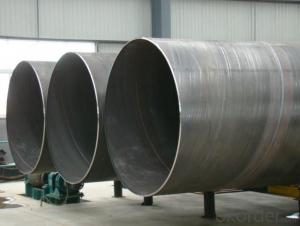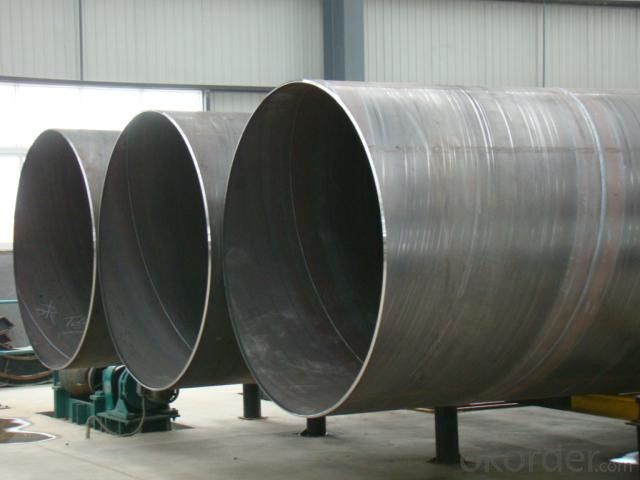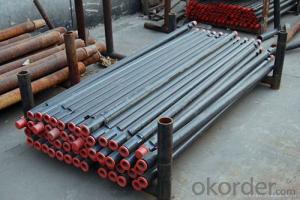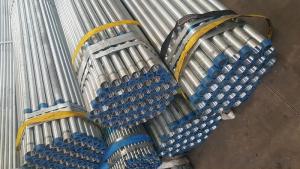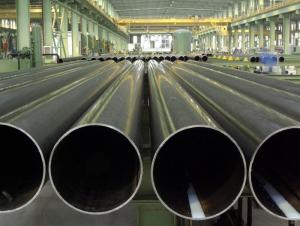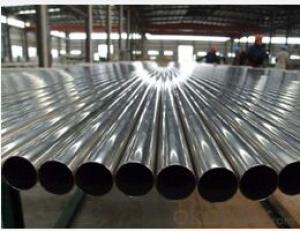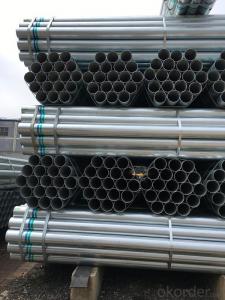Welded Steel -- Welded Steel Tube and Pipe
- Loading Port:
- Tianjin
- Payment Terms:
- TT OR LC
- Min Order Qty:
- 25 m.t.
- Supply Capability:
- 8000 m.t./month
OKorder Service Pledge
OKorder Financial Service
You Might Also Like
1、Structure of Welded Steel Tube EN10216-1:
Welded Steel Tube and Pipe is formed by drawing a solid billet over a piercing rod to create the hollow shell. As the manufacturing process does not include any welding, Welded Steel Tube are perceived to be stronger and more reliable. Historically Welded Steel Tube was regarded as withstanding pressure better than other types, and was often more easily available than welded pipe.
2、Main Features of the Welded Steel Tube EN10216-1:
• High manufacturing accuracy
• High strength
• Small inertia resistance
• Strong heat dissipation ability
• Good visual effect
• Reasonable price
3、Welded Steel Tube EN10216-1 Specification:
Standard | GB, DIN, ASTM ASTM A106-2006, ASTM A53-2007 |
Grade | 10#-45#, 16Mn 10#, 20#, 45#, 16Mn |
Thickness | 8 - 33 mm |
Section Shape | Round |
Outer Diameter | 133 - 219 mm |
Place of Origin | Shandong, China (Mainland) |
Secondary Or Not | Non-secondary |
Application | Hydraulic Pipe |
Technique | Cold Drawn |
Certification | API |
Surface Treatment | factory state or painted black |
Special Pipe | API Pipe |
Alloy Or Not | Non-alloy |
Length | 5-12M |
Outer Diameter | 21.3-610mm |
Grade | 20#, 45#, Q345, API J55, API K55, API L80, API N80, API P110, A53B |
Standard | ASME, ASTM |
1) Material:20#(ASTM A 106/A53 GRB.API5LGRB,GB),45#,16Mn,10#.
2) Specification range:OD:21.3-610mm,WT:6-70mm,length:6-12m or according to the requirement of clients.
3) Excutive standards:GB,ASME API5L.ASTM A 106/A53,Despite of the above standards,we can also supply seamless steel pipe with standard of DIN,JIS,and so on,and also develop new products according to the requirements of our clients!
4) Surface:black lacquered,varnish coating or galvanized.
5) Ends:Beveled or square cut,plastic capped,painted.
6) Packing:bundles wrapped with strong steel strip,seaworthy packing.
4、Packaging & Delivery
Packaging Details: | seaworthy package,bundles wrapped with strong steel strip |
Delivery Detail: | 15-30days after received 30%TT |
5、FAQ of Welded Steel Tube EN10216-1:
①How is the quality of your products?
Our products are manufactured strictly according to national and internaional standard, and we take a test
on every pipe before delivered out. If you want see our quality certifications and all kinds of testing report, please just ask us for it.
Guaranteed: If products’ quality don’t accord to discription as we give or the promise before you place order, we promise 100% refund.
②How about price?
Yes, we are factory and be able to give you lowest price below market one, and we have a policy that “ for saving time and absolutely honest business attitude, we quote as lowest as possible for any customer, and discount can be given according to quantity”,if you like bargain and factory price is not low enough as you think, just don’t waste your time.Please trust the quotation we would give you, it is professional one.
③Why should you chose us?
Chose happens because of quality, then price, We can give you both.Additionally, we can also offer professional products inquiry, products knowledge train(for agents), smooth goods delivery, exellent customer solution proposals.Our service formula: good quality+good price+good service=customer’s trust
SGS test is available, customer inspection before shipping is welcome, third party inspection is no problem.
6、Welded Steel Tube EN10216-1 Images:
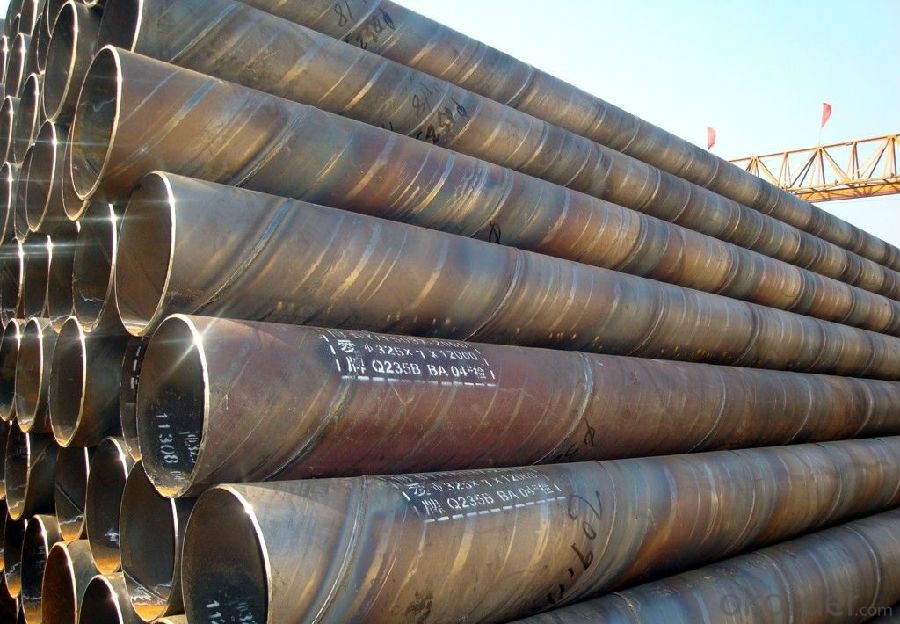
- Q: What is the role of steel pipes in the telecommunications industry?
- Steel pipes play a crucial role in the telecommunications industry as they are used for the installation of underground and overhead telecommunication cables. These pipes provide protection and support to the cables, ensuring their safety and longevity. Additionally, steel pipes are also used in the construction of communication towers and infrastructure, making them an essential component in establishing and maintaining reliable telecommunications networks.
- Q: What are the different methods of testing steel pipes?
- There are several methods of testing steel pipes, including visual inspection, ultrasonic testing, magnetic particle testing, liquid penetrant testing, radiographic testing, and hydrostatic testing. Each method serves a specific purpose in evaluating the quality and integrity of steel pipes, ensuring they meet industry standards and are suitable for their intended applications.
- Q: Can steel pipes be used for underground sewerage systems?
- Indeed, underground sewerage systems can make use of steel pipes. These pipes possess remarkable strength and durability, rendering them suitable for the transportation of sewage beneath the surface. Their resistance to corrosion is high, allowing them to withstand the pressure and weight of the soil above. Moreover, steel pipes boast an extended lifespan and exhibit resilience against environmental factors like moisture, chemicals, and temperature variations. Furthermore, the ease of welding steel pipes makes the process of installation and repairs more convenient. Nevertheless, it is crucial to ensure that these steel pipes are adequately coated or lined to prevent corrosion and comply with local regulations and standards pertaining to underground sewerage systems.
- Q: Are steel pipes suitable for underground industrial waste disposal?
- Steel pipes are often used for underground industrial waste disposal due to their durability and strength. They have the ability to withstand the harsh conditions underground, including moisture, pressure, and corrosion. Additionally, steel pipes are resistant to chemical reactions, making them suitable for handling various types of industrial waste. They can effectively transport and contain hazardous materials, ensuring the safety and protection of the environment and surrounding areas. Overall, steel pipes are considered a reliable and efficient option for underground industrial waste disposal.
- Q: Can steel pipes be used for underground culverts?
- Yes, steel pipes can be used for underground culverts. Steel pipes are known for their strength, durability, and resistance to various environmental factors, which makes them suitable for underground applications. They can withstand heavy loads, high water pressure, and the corrosive effects of soil and water. Additionally, steel pipes are available in various sizes and thicknesses, allowing for customization to fit specific project requirements. However, it is important to consider factors such as the soil conditions, water table levels, and potential for corrosion when selecting the appropriate type of steel and protective coatings for the pipes.
- Q: What are the quality control measures for steel pipe manufacturing?
- Quality control measures for steel pipe manufacturing typically include: 1. Raw material inspection: Ensuring that the steel used for manufacturing pipes meets the required specifications and standards. 2. Dimensional checks: Verifying the outer diameter, wall thickness, and length of the pipes to ensure they meet the specified tolerances. 3. Visual inspection: Examining the surface of the pipes for any defects, such as cracks, pits, or corrosion, that could impact their quality or performance. 4. Mechanical testing: Conducting tests, such as tensile strength, yield strength, and hardness tests, to assess the mechanical properties of the pipes. 5. Non-destructive testing (NDT): Employing techniques like ultrasonic testing, magnetic particle inspection, or radiography to detect internal defects or flaws in the pipes without damaging them. 6. Welding inspection: Assessing the quality and integrity of welds used in joining pipe sections together, ensuring they meet the required standards. 7. Coating inspection: Checking the applied protective coatings for uniformity, adhesion, and resistance to corrosion or other environmental factors. 8. Pressure testing: Subjecting a sample of pipes to a hydraulic or pneumatic pressure test to verify their ability to withstand the intended operating conditions without leakage or failure. 9. Packaging and labeling: Ensuring proper packaging and labeling of the pipes, including identification of grade, size, and other relevant details, to facilitate easy identification and handling. 10. Documentation: Maintaining comprehensive records of all quality control activities, including test results, inspection reports, and certifications, for traceability and quality assurance purposes.
- Q: Can steel pipes be used for signposts or street lighting poles?
- Yes, steel pipes can be used for signposts or street lighting poles. Steel pipes are often chosen for their durability, strength, and resistance to harsh weather conditions, making them suitable for supporting signs or street lighting fixtures.
- Q: Are steel pipes suitable for oil and petroleum applications?
- Yes, steel pipes are highly suitable for oil and petroleum applications. They possess excellent strength, durability, and resistance to corrosion, making them ideal for transporting and storing oil and petroleum products. Steel pipes can withstand high pressure and extreme temperatures, ensuring the safety and efficiency of oil and petroleum operations.
- Q: Seamless steel pipe 8162 and 8163 what is the difference?
- GB 8162 is the structure of the tube, there is no need for flaw detection, the use of mechanical processing, stents;
- Q: Steel pipe is particularly long, how to clean the inner wall of the pipe so that it can be thoroughly cleaned
- If the pipe is relatively long, you have water, you can buy ultrasonic vibration plate into the water for ultrasonic cleaning, if not too long with an ultrasonic vibration rod, inserted into the pipe cleaning, and then rinse with water by ultrasonic stripping of dirt, give you recommend a factory in Jining Hengda
Send your message to us
Welded Steel -- Welded Steel Tube and Pipe
- Loading Port:
- Tianjin
- Payment Terms:
- TT OR LC
- Min Order Qty:
- 25 m.t.
- Supply Capability:
- 8000 m.t./month
OKorder Service Pledge
OKorder Financial Service
Similar products
Hot products
Hot Searches
Related keywords
